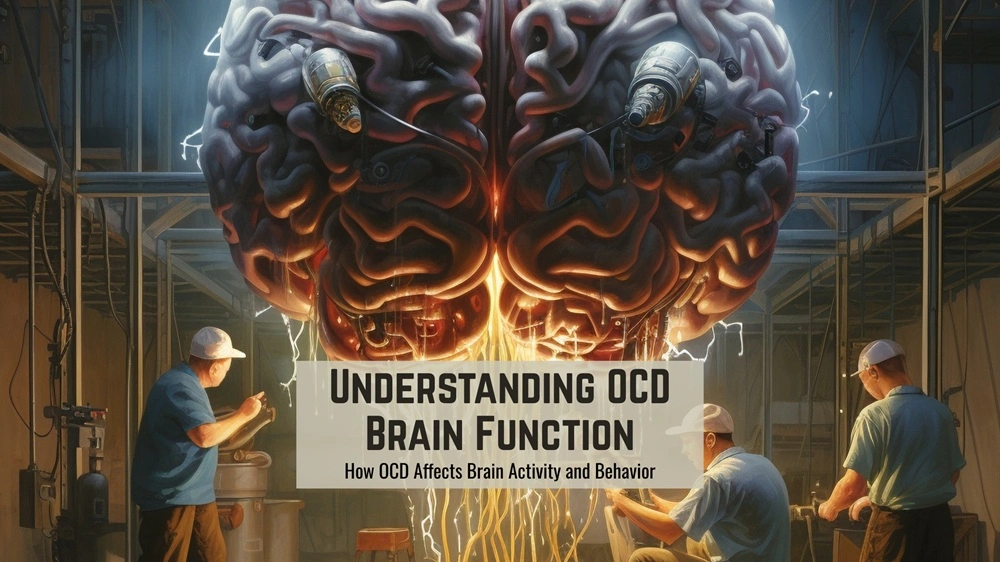
Obsessive-Compulsive Disorder (OCD) is more than a mental health condition, it’s a neurobiological disorder that affects how certain parts of the brain communicate and function. Understanding OCD brain function helps demystify why individuals experience persistent intrusive thoughts (obsessions) and repetitive behaviors (compulsions).
At Patna Psychiatry, under the guidance of Dr. Saurabh Kumar, MD (Psychiatry), one of the best psychiatrist in Patna, patients receive evidence-based evaluation and treatment for OCD and related disorders. This blog explores how OCD impacts brain structure, chemistry, and function, and what current research says about the affected brain regions.
What Is OCD and Why the Brain Plays a Key Role
OCD involves unwanted, intrusive thoughts that cause anxiety and repetitive actions performed to reduce that anxiety. While symptoms appear behavioral, the root cause lies in abnormal brain circuitry and neurotransmitter imbalance.
Recent brain imaging studies using fMRI and PET scans have shown that OCD brain activity differs significantly from that of people without the disorder. The hyperactivation of certain brain regions results in difficulty suppressing intrusive thoughts or regulating repetitive actions.
OCD Brain Function: Understanding the Neural Pathways
The OCD brain function primarily revolves around three interconnected brain areas:
Orbitofrontal Cortex (OFC):
The OFC helps in decision-making and evaluating potential risks. In OCD patients, this area is overactive, leading to excessive worry or the perception that something is wrong—even when everything is fine.
Anterior Cingulate Cortex (ACC):
This region is involved in error detection and emotional regulation. Overactivity in the ACC makes individuals feel that something bad might happen unless they act, triggering compulsive behaviors.
Caudate Nucleus (part of the Basal Ganglia):
The caudate nucleus filters messages between the OFC and thalamus. In an OCD brain, this filtering mechanism becomes inefficient, causing repetitive thought loops and reinforcing compulsions.
Together, these structures form a feedback loop called the Cortico-Striato-Thalamo-Cortical (CSTC) circuit, which becomes dysregulated in OCD. This dysfunction explains the inability to suppress repetitive thoughts or actions despite recognizing their irrationality.
Does OCD Damage the Brain?
A common question patients ask is: “Does OCD damage the brain?”
The short answer is - OCD does not cause permanent brain damage, but it does alter brain functioning and connectivity. Studies reveal that people with chronic OCD show differences in gray matter volume in specific brain regions, particularly the frontal cortex and basal ganglia. However, these changes are functional and reversible with proper treatment such as medication, therapy, or neurostimulation.
Effective management can normalize brain activity and restore healthy communication between brain regions. Therefore, timely intervention under the best psychiatrist in Patna is crucial for preventing long-term functional impairment.
Chemical Imbalances and OCD Brain Function
The OCD brain also shows irregularities in neurotransmitters, chemical messengers that regulate mood and behavior.
Serotonin:
The most studied neurotransmitter in OCD. Low serotonin activity is linked to increased anxiety and repetitive thoughts. This is why SSRIs (Selective Serotonin Reuptake Inhibitors) are highly effective in treating OCD.
Dopamine and Glutamate:
Emerging research indicates that imbalances in dopamine and glutamate also contribute to OCD symptoms. Dopamine affects motivation and reward circuits, while glutamate influences neuronal communication and learning.
Balancing these neurotransmitters can significantly improve OCD brain function, reducing both intrusive thoughts and compulsions.
Neuroplasticity and Recovery
The brain’s remarkable ability to change known as neuroplasticity, means that with the right treatment, OCD-related brain changes can be reversed or improved. Cognitive Behavioral Therapy (CBT), particularly Exposure and Response Prevention (ERP), helps rewire faulty circuits in the brain by reducing the brain’s overreaction to perceived threats.
At Patna Psychiatry, treatment plans often include a combination of CBT, medication, and lifestyle adjustments. These methods promote new neural pathways that replace the dysfunctional OCD circuits.
Research on Brain Imaging and OCD
Advanced neuroimaging technologies provide visual evidence of OCD brain dysfunction. MRI and PET scans show hyperactivity in the OFC and thalamus before treatment, which decreases after effective therapy. This visual proof reinforces that OCD is a brain-based disorder and not a matter of willpower or personality.
Such studies also guide psychiatrists like Dr. Saurabh Kumar in developing personalized treatment strategies. Understanding each patient’s unique neurochemical and behavioral profile helps achieve better, lasting outcomes.
Can OCD Be Cured?
Even though OCD might not be entirely curable, it can be well controlled through appropriate therapy and care. Many patients experience significant relief through long-term treatment. With continued therapy and medication, brain function often returns to near-normal levels.
Ongoing care at Patna Psychiatry, led by the best psychiatrist in Patna, ensures that patients receive comprehensive management addressing both the biological and psychological aspects of the condition.
Conclusion
Understanding OCD brain function offers hope to patients and families dealing with this complex disorder. OCD alters communication within key brain circuits but does not permanently damage the brain. With modern psychiatric treatment, therapy, and consistent medical guidance, these neural imbalances can be corrected, helping individuals regain control over their thoughts and lives.
If you or someone you know is struggling with OCD, seek timely evaluation and treatment at Patna Psychiatry, where expert care by Dr. Saurabh Kumar, MD (Psychiatry) can help restore balance and peace of mind.
Visitors: 101





No comments yet.